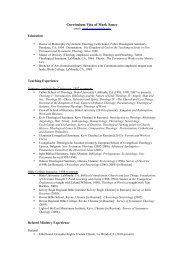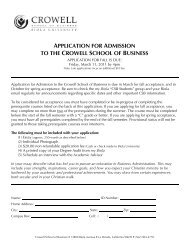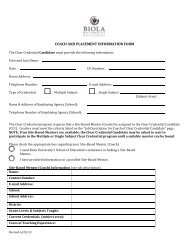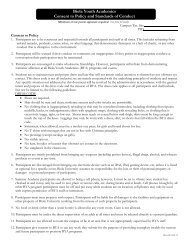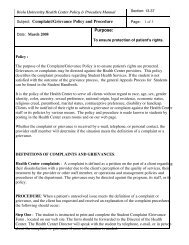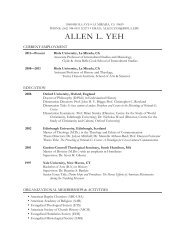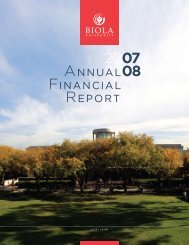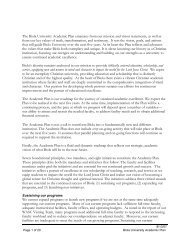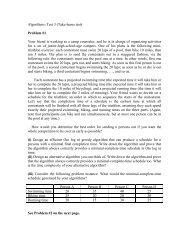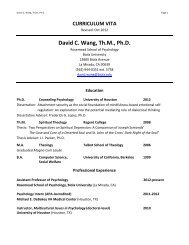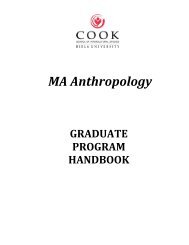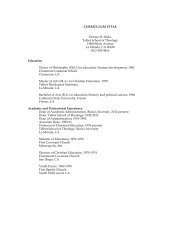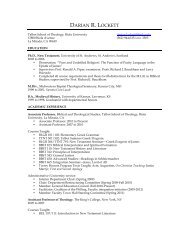You also want an ePaper? Increase the reach of your titles
YUMPU automatically turns print PDFs into web optimized ePapers that Google loves.
The Master of Arts degree in intercultural studies, missions, applied<br />
linguistics and TESOL.<br />
The Doctor of Missiology and the Doctor of Philosophy degree in<br />
intercultural education.<br />
ta l b o t s C h o o l o f t h e o l o G y<br />
The Bachelor of Arts degree in biblical studies and Christian education<br />
ministries.<br />
The Master of Arts degree with emphasis in Bible exposition, New<br />
Testament, Old Testament, theology, philosophy of religion and<br />
ethics, spiritual formation, and biblical and theological studies-diversified.<br />
The Master of Arts degree in Christian education.<br />
The Master of Arts degree in Christian ministry and leadership with<br />
emphases in pastoral care and counseling, and women’s ministries.<br />
The Master of Arts degree in spiritual formation and soul care.<br />
The Master of Arts degree in ministry with emphases in pastoral,<br />
Christian education and marriage and family ministries, and missions.<br />
Talbot also offers the Master of Divinity degree, the Master of Theology<br />
degree, the Doctor of Ministry degree, the Doctor of Education,<br />
and the Doctor of Philosophy degree in educational studies.<br />
r o s e m e a d s C h o o l o f P s yC h o l o G y<br />
The Bachelor of Arts degree in psychology.<br />
The Master of Arts, the Doctor of Psychology and the Doctor of<br />
Philosophy degree in clinical psychology.<br />
s C h o o l o f P r o f e s s I o n a l s t U d I e s<br />
The Bachelor of Arts degree in psychology.<br />
The Bachelor of Science degree in organizational leadership, and<br />
ministry leadership.<br />
The Master of Arts degree in Christian apologetics, organizational<br />
leadership, and science and religion.<br />
s C h o o l o f b U s I n e s s<br />
The Bachelor of Science degree in business administration.<br />
The Master’s of Business Administration degree.<br />
Undergraduate Programs<br />
C h o o s I n G a n U n d e r G r a d Uat e m a j o r<br />
Every student should choose a major by the end of the sophomore<br />
year so that he or she may complete the major requirements in a<br />
timely fashion.<br />
To help students, the <strong>University</strong> has available a number of useful<br />
resources to assist in making the decision: academic advisors, careers<br />
counselors, First-Year Seminar classes conducted during the first<br />
semester of attendance, curriculum charts detailing the academic<br />
requirements for each program, and various fliers and brochures<br />
produced by each department.<br />
The task of selecting a major (and often a minor or other complimentary<br />
specializations) becomes one of crystallizing ideas on the basis<br />
of experiences in specific courses, discussions with other students,<br />
staff and faculty. Faculty advising is a service offered to students;<br />
however each student is responsible for choosing courses and fulfilling<br />
graduation requirements.<br />
Students must plan freshman or sophomore programs which will<br />
permit them to enter or take advanced courses in fields they may<br />
want to pursue. They should be sure to begin or complete requirements<br />
such as mathematics, chemistry or a foreign language early in<br />
their academic careers. Students anticipating graduate or professional<br />
study should exercise special care in planning undergraduate<br />
programs and seek faculty counseling in the field of interest.<br />
Advance examination of the possibilities of graduate or professional<br />
study will be helpful to students who have clear educational and<br />
vocational objectives.<br />
note: The student’s transcript cannot be altered to add a major<br />
or minor once the degree is completed.<br />
U n d e C l a r e d m a j o r s<br />
Students who are uncertain about their primary educational or vocational<br />
goals may enroll as undeclared majors. However, they should<br />
consult an advisor in the Academic Advising Office prior to registration<br />
each semester. While most undeclared students will enroll in<br />
primarily general education and Biblical Studies requirements, many<br />
general education requirements are “major specific” and should be<br />
chosen with possible majors in mind. A student should not plan to<br />
stay “undeclared” for more than three semesters.<br />
P l a n n I n G a m a j o r P r o G r a m<br />
When students have selected a major field, they should study all the<br />
requirements that are specified in this catalog under their chosen<br />
degree program. They should make a tentative semester by semester<br />
plan for completing the requirement including prerequisites and<br />
discuss this plan with an advisor in the major.<br />
In addition to courses in the major department, related courses<br />
in other fields and supporting courses in basic skills may also be<br />
required. These should be included in the tentative semester by<br />
semester plan.<br />
Some departments require an application to the department and<br />
acceptance; and or placement tests prior to admission to classes. The<br />
times and places for the tests are determined by the department.<br />
Students should contact departments for testing times.<br />
General Information <strong>Biola</strong> <strong>University</strong>



